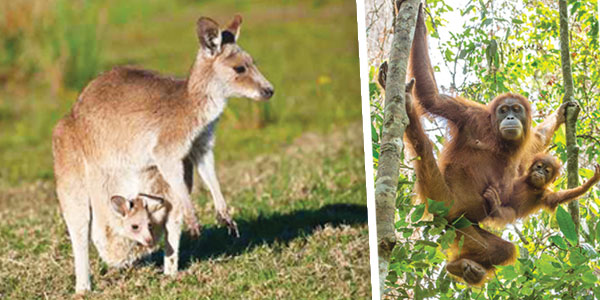|
Different animals raise their young in different ways. For instance, kangaroos give birth to underdeveloped young and then carry them in their pouch until they’re ready to go off on their own. Their baby is only about the size of a jelly bean and blind when it's born, yet it instinctively manages to climb up the mother’s body and into her pouch. It can remain in the pouch for up to 10 months.
Elephant mothers are pregnant with their baby for 22 months. Once they give birth, the baby will weigh around 250 pounds. Baby elephants, though enormous, are extremely dependent on their mothers, nursing for up to 3 years.
Emperor penguins also have a good record for being incredible mothers. After the mother lays a single egg, she goes on a 35-70 mile journey to find food. The father will watch over the egg until it hatches. When the mother returns, she must now find the father and chick, then regurgitate the fish she ate to feed the new baby.
The wolf spider is also a great mother, she attaches her egg sack to her body and travels with it. If she's separated from the egg sac, she will search furiously for it. After hatching, the spiderlings climb on their mother’s back and she carries them around until they're old enough to care for themselves.
The highly intelligent orangutan spends nearly all her life high up in the trees, where she builds a new nest every single night fashioning more than 30,000 homes in her lifetime. She also never puts her babies down, generally nursing offspring until they reach the age or 6 or 7 – that's the longest dependence of any animal on Earth.
When it comes to having babies, the female octopus doesn't mess around – she lays over 50,000 eggs. It takes around 40 days for the them to develop before hatching, and the mom stays close to them the entire time, protecting them from predators while gently blowing currents of water over them to provide oxygen. But playing bodyguard to the eggs also prohibits her from hunting for herself, so she may actually be forced to eat one of her eight arms for nutrition.
Victoria’s Fun Facts and Tips
~ Polar Bear Moms have one of the easiest labors on record. She digs a maternity den where she goes into a hibernation-like state, doesn't eat for two months and also sleeps through the baby's birth.
~ Orangutan kids will stay with their mothers until they’re about six years old and will constantly visit throughout their life.
~ Alligators make extremely attentive moms. After creating the perfect nest of heaping vegetation, they carry the newborns in their jaws for ultimate protection.
|














 20 lucky winners will win $500 each in prizes totaling $10,000.
20 lucky winners will win $500 each in prizes totaling $10,000. 